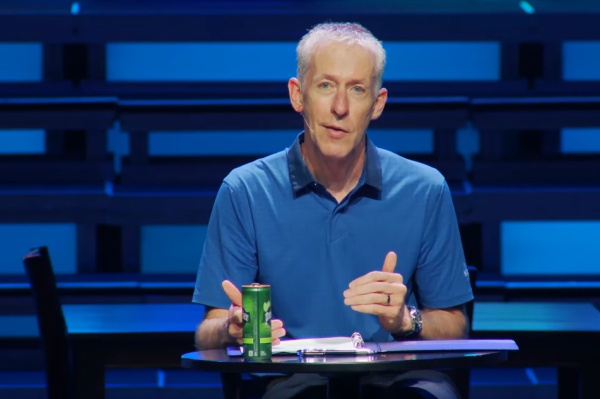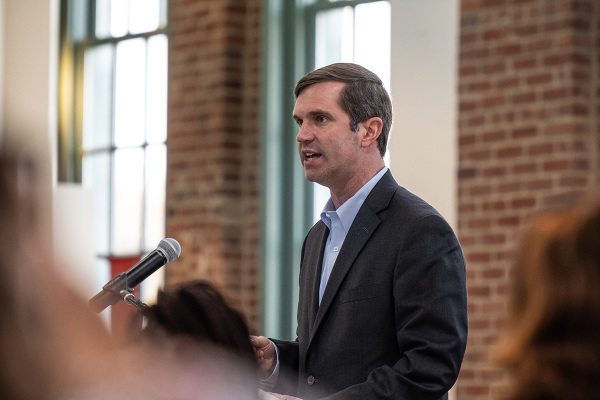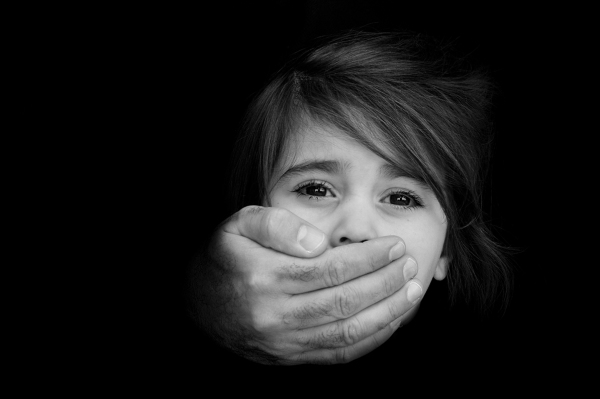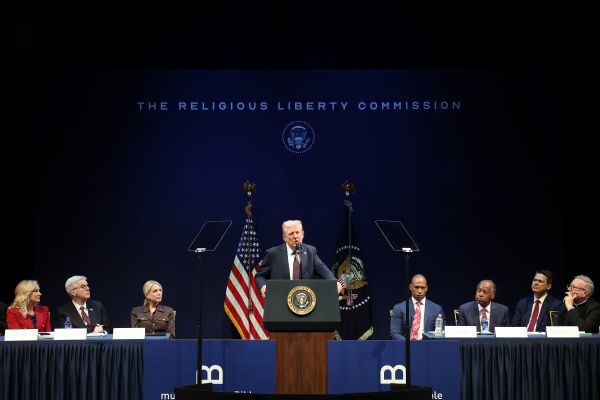Pro-Trump Christian group knocks on over 1M doors, plans to spend $40M on 2020 voting campaign
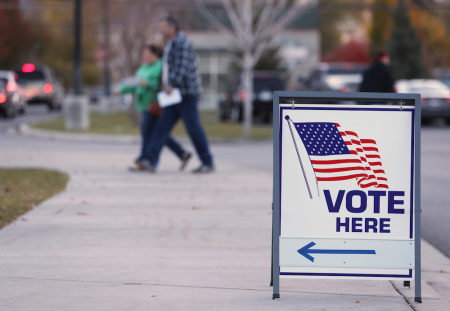
Hundreds of canvassers affiliated with a grassroots campaign dedicated to mobilizing conservative evangelical and Catholic voters have knocked on nearly 1 million doors nationwide in the past month to encourage people to vote for President Donald Trump this November.
As the U.S. heads into the final two months before the 2020 election, volunteers from the Faith & Freedom Coalition have been going from neighborhood to neighborhood in battleground states speaking with residents about the upcoming election and handing out voter guides to be distributed in churches.
The Faith & Freedom Coalition, a national social conservative organization based in Atlanta, Georgia, and founded in 2009 by prominent evangelical activist Ralph Reed, has chapters in 21 states and began its election mobilization efforts during the first week of August.
“Normally, we start in September. But we backed it up a little bit this year just because the gravity of the election cycle merited an extra month of engagement,” FFC Executive Director Tim Head told The Christian Post. “As we head into Labor Day weekend, we are expecting on Sunday or Monday to hit our 1 millionth door.”
The organization, whose canvassers knocked on 1.2 million doors during the buildup to the 2016 general election and 2.25 million doors for the 2018 midterms, is hoping to knock on as many as 5 million doors by Nov. 3.
Head said FFC has as many as 800 volunteers nationwide who've engaged in the voter-turnout campaign so far and expects that when the election is over as many as 6,000 volunteers will have engaged with the perspective voters.
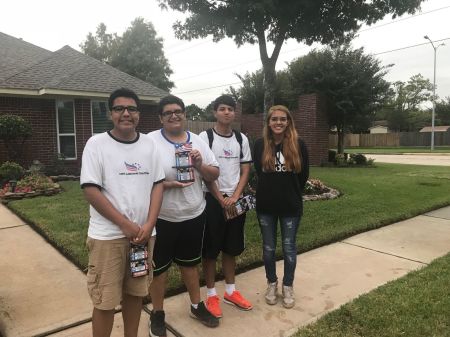
“As more and more people get interested in the election, more and more volunteers will start to pick up the pace,” Head expects. “We’ll hit about 1 million in the month of August. We’ll probably hit just shy of 2 million in the month of September. Then, we’ll probably hit just over 2 million in the month of October.”
The efforts are mostly focused on the presidential and U.S. Senate races, but in some states, FFC voter guides highlight competitive House races as well as some state-level gubernatorial races.
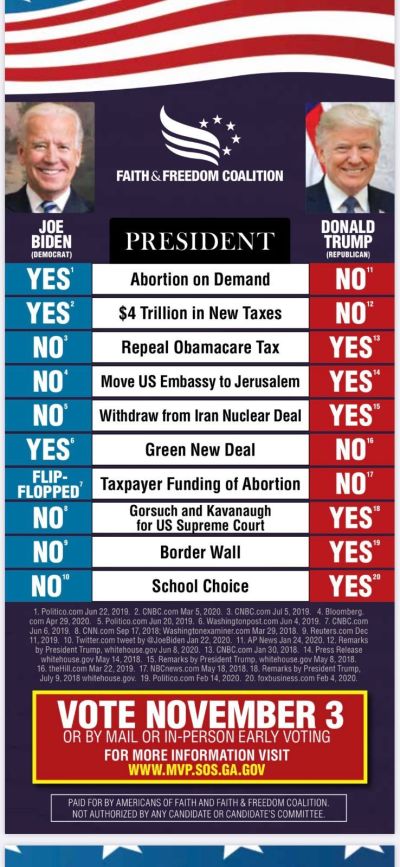
“The voter guide is a side by side comparison of the Republican candidate and the Democrat candidate and where they fall on various issues,” Head said of the political literature.
“All of this is researched and documented from their campaign documentation or remarks they have made in the media or something to that effect. If we are talking about abortion-on-demand, it will show President Trump’s position and Vice President Biden’s stated position. We document that and footnote down at the bottom. If somebody needs to corroborate it, they can find the timestamp on the voter guide itself.”
Over the course of the last decade, Head said FFC has “refined” the voter guides quite a bit.
“They are simple. But their simplicity is their complexity,” he added.
But canvassing during a pandemic brings its own set of challenges and opportunities.
“More people are home than normal. But we also see a fair number of people who come to the door but don’t necessarily want to open the door,” the executive director stressed.
“I would say 20% of the people that we go to their home just kind of come to the window and kind of wave politely but may not open the door. In that case, we leave the voter guide on the door hanger or knob. We get a lot of thumbs up and waving and smiling. Ironically, some people are even in masks in their homes. We have gotten a smattering of reports to that effect in different parts of the country.”
FFC expects to spend upwards of $40 million on various mobilization efforts and strategies to encourage voters of faith to cast their ballots in November.
Such efforts include a direct mail campaign and even operating phone banks on college campuses across the country.
“It’s probably a 15% increase [in spending] from 2016 and comparable to 2018,” Head said.
“That will include a pretty elaborate mail component and a pretty elaborate phone component in the closing weeks and days.”
While FFC is operating in 21 states, the organization has a special eye on swing states as it has footprints in Florida, North Carolina, Pennsylvania, Ohio, Michigan, Wisconsin, Nevada and Arizona.
FFC is not alone as other organizations like My Faith Votes and the social conservative advocacy group Family Research Council have also engaged in efforts to drive evangelical voter turnout in 2020.
Earlier this year, the nonprofit voter mobilization organization My Faith Votes launched a bipartisan initiative called Our Church Votes that seeks to encourage the 25 million Christians who didn't vote in 2016 to vote in 2020. The initiative serves as a tool for pastors and church leaders to engage with their congregations about the political process.
In the 2016 election, exit polls show that Trump got about 81% of the white evangelical or born-again Christian vote while Hillary Clinton got just 16% of that demographic.
Although Head believes the Biden campaign has done more outreach to voters of faith than the Clinton campaign, he believes more white evangelicals support Trump in 2020 than they did in 2016.
“In 2016, then-candidate Trump was running was running purely on his rhetorical statements and never held office, so there was no track record to point to,” he said. “Some people thought that was smoke and mirrors and he was going to deviate from the stuff he was promising on the stump. But honestly, he has delivered. It's been one thing after another.”
“He has done that for the evangelical and Catholic crowd to extraordinary degrees,” he continued. “On top of that, Vice President Biden has changed a lot of public policy positions over the decades and I think a lot of people don’t consider him to be a particularly strong leader. At a time when our nation needs a strong leader with a proven record, I actually think the contrast is becoming even more stark in 2020 than it was, ironically, in 2016.”
FFC canvassers are reporting that faith voters they talk with are most concerned right now with the economic recovery efforts from the COVID-19 shutdowns and law-and-order amid the riots, vandalism and arson attacks, Head stressed.
“So COVID shutdowns and riots are top of mind for faith-based voters,” he said. “If that continues to be the case for the next 60 days, I think that Trump’s positioning on those two issues bodes well for him.”
“The proliferation of riots and the lack of responsiveness by Democrat leaders across the country is repelling a lot of moderate Democrats,” Head argued. “There is a significant uptick just in the last month alone of moderate Democrats moving in the direction of Trump because of local Democrat leaders’ lack of action and silence on the part of national Democrats.”
Follow Samuel Smith on Twitter: @IamSamSmith
or Facebook: SamuelSmithCP










